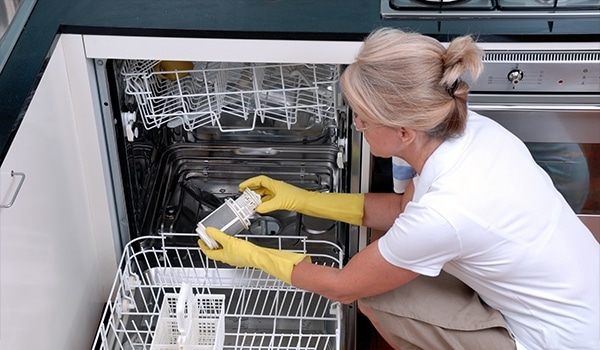Maintaining your appliances is essential for ensuring their longevity and optima...
30 Jul 2024
# 1 Equipment Repairing Service In Houston, TX. Get appointment today

25
Jul
Extending the life of your dishwasher involves more than just regular use; it requires careful maintenance and attention to detail. By adopting a few key practices, you can enhance its efficiency, maintain its cleanliness, and avoid common issues that lead to repairs. This guide will cover essential aspects such as regular maintenance, the importance of cleaning and descaling, choosing the right detergents, and recognizing signs that your dishwasher may need professional attention. Implementing these strategies will not only prolong your dishwasher’s lifespan but also ensure it operates at peak performance, saving you time and money on potential costly repairs.
Regular maintenance is crucial for keeping your dishwasher in optimal working condition and extending its lifespan. Implementing a few simple practices can prevent common issues and reduce the need for costly repairs. Here’s how you can maintain your dishwasher effectively:
Clean the Filter Regularly. Most dishwashers have a removable filter located at the bottom of the machine. This filter catches food particles and debris, preventing them from redepositing on your dishes or clogging the drain. Clean the filter under running water at least once a month or more frequently if you notice it becoming clogged. This helps maintain water flow and cleaning efficiency.
Inspect and Clean the Spray Arms. The spray arms distribute water throughout the dishwasher during a wash cycle. Over time, the holes on the spray arms can get clogged with mineral deposits and food remnants, which can impede water flow and affect cleaning performance. Regularly check the spray arms for clogs and use a small pin or toothpick to clear out the holes. Running a vinegar rinse through the dishwasher can also help dissolve any build-up.
Check and Clean Door Seals. The rubber seals around the dishwasher door prevent water from leaking out during operation. If these seals are damaged or dirty, leaks can occur, and the efficiency of the dishwasher can be compromised. Regularly inspect the seals for wear and tear and clean them with a damp cloth to remove any food particles or residues that might cause mold or mildew.
Run Empty Cycles with a Cleaner. Every few months, it’s a good idea to run an empty cycle with a dishwasher cleaner to remove grease and limescale build-up that can affect the machine’s performance. This not only cleans the dishwasher but also helps eliminate odors.
Ensure Proper Loading. Improper loading can lead to dishes blocking the spray arms or detergent dispenser, which can cause poor cleaning results and put extra strain on the dishwasher’s pump and motor. Make sure to load the dishwasher according to the manufacturer’s instructions to ensure optimal cleaning and prevent mechanical problems.
Regularly Check and Tighten Connections. Periodically check the water inlet and drainage hoses for leaks. Tighten any loose connections and replace hoses that show signs of wear or damage to prevent water damage and maintain proper function.
By adhering to these regular maintenance practices, you can significantly extend the life of your dishwasher, ensure it runs efficiently, and save money by avoiding unnecessary repairs. Regular attention not only keeps your dishwasher in top condition but also ensures that it remains a reliable and efficient part of your kitchen appliances.
Regular cleaning and descaling of your dishwasher are essential for maintaining its efficiency and prolonging its lifespan. These processes help prevent the buildup of limescale and grease, which can impair the dishwasher's functionality and lead to the need for repairs. Here’s a step-by-step guide to effectively clean and descale your dishwasher:
Clean the Interior. Begin by removing any bits of food or debris from the bottom of the dishwasher. Wipe down the walls and the door of the dishwasher with a damp cloth. Pay special attention to the area around the door seal, as food and grime tend to accumulate here and can lead to mold and bad odors.
Clean the Filter. As part of regular maintenance, the filter should be cleaned frequently. Remove the filter from the bottom of the dishwasher, and rinse it under running water. Use a soft brush to remove any stuck-on food particles or other debris. Ensure the filter is completely clean before reinstalling it, as a clogged filter can decrease cleaning efficiency.
Descaling the Dishwasher. Hard water can leave limescale deposits in your dishwasher, which can clog water jets and reduce heating efficiency. To descale, fill a dishwasher-safe cup or bowl with white vinegar and place it on the top rack of the empty dishwasher. Run a hot-water cycle. The vinegar will disperse throughout the cycle, breaking down the limescale and mineral buildup.
Cleaning Spray Arms. Remove the spray arms periodically and rinse them under water, using a soft brush or a toothpick to remove any clogs in the holes where water sprays out. This ensures that water can flow freely, improving the dishwasher’s ability to clean effectively.
Monthly Maintenance Wash. Run a maintenance wash once a month by using a commercially available dishwasher cleaner or baking soda. Pour a cup of baking soda across the bottom of the dishwasher and run a hot water cycle. This will help remove any lingering odors and additional grease or grime buildup.
Wipe Down the Edges and Controls. Don’t forget to clean the edges of the dishwasher door and the control panel. Use a damp cloth to wipe down these areas, as they can collect fingerprints and smudges, which don't necessarily affect the dishwasher's function but can lead to a buildup of grime over time.
By regularly cleaning and descaling your dishwasher, you ensure that it operates at peak performance and prevent common problems associated with dirt and mineral buildup. This not only keeps your dishes cleaner but also minimizes the need for repairs and extends the overall life of the appliance.
Choosing the right detergent is crucial for both the effectiveness of your dishwasher and the longevity of the appliance. Using inappropriate or low-quality detergents can lead to buildup, poor cleaning results, and even damage to the dishwasher’s internal components. Here are some tips for selecting and using the right detergents:
Choose High-Quality Detergent. Opt for high-quality dishwasher detergents that are designed for your type of dishwasher. Tablets and pods often provide the right balance of detergent, rinse aid, and other cleaning agents, which helps protect the machine and achieve better cleaning results.
Check for Compatibility. Ensure that the detergent is suitable for your dishwasher model and water hardness. Some detergents are specifically formulated to work better in either hard or soft water conditions, which can significantly affect cleaning efficacy and the likelihood of mineral deposits.
Use the Correct Amount. Overusing detergent can lead to soap residue and excess suds, which may not only leave your dishes cloudy but also strain the dishwasher’s pump and filters. Always follow the manufacturer’s recommendation on the amount of detergent to use per load.
Consider Rinse Aids and Softeners. Incorporating rinse aids can enhance the drying process and prevent water spots and film from forming on dishes. If you have hard water, using a water softener in conjunction with your regular detergent can prevent limescale buildup, which is a common reason for dishwasher repairs.
By using the right detergents, you not only ensure that your dishes come out sparkling clean but also contribute to the ongoing maintenance and efficiency of your dishwasher, reducing the frequency and severity of repairs.
Recognizing the signs that your dishwasher needs repair can save you from more severe and costly problems down the line. Here are key indicators that your dishwasher may require professional attention:
Poor Cleaning Results. If your dishes come out dirty or with residues after a wash cycle, it could indicate an issue with the spray arms, water supply, or heating element.
Unusual Noises. Strange noises, such as grinding, buzzing, or rattling, are often signs of a mechanical problem. It could be something as simple as an item obstructing the spray arm or as serious as a failing motor.
Water Leaks. Any signs of water leaking around the dishwasher could indicate a loose connection, failing door seal, or problems with the pump or hoses. Address leaks promptly to avoid water damage to your home.
Not Draining Properly. If water remains in the dishwasher after a cycle ends, there might be a clog in the drain system or an issue with the drain pump.
Door Latch Failure. If the dishwasher door doesn’t latch properly, it won’t start. This could be due to a faulty latch mechanism or misalignment.
Recognizing these signs and seeking repairs early can extend the life of your dishwasher, improve its performance, and avoid the inconvenience and costs of a complete breakdown. Regular maintenance and addressing small issues promptly are crucial in keeping your dishwasher running efficiently.
Proper maintenance, regular cleaning, using the right detergents, and recognizing signs of necessary repairs are essential for extending the life of your dishwasher. By following these guidelines, you can ensure optimal performance, save on energy costs, and avoid expensive repairs, keeping your dishwasher functioning efficiently for years to come.





77095, Houston, TX


 stay tuned we are
stay tuned we are

Just leave a request and we will call you back within 10 minutes and provide professional advice.
Your personal data will only be used to contact you and will not be shared with third parties.